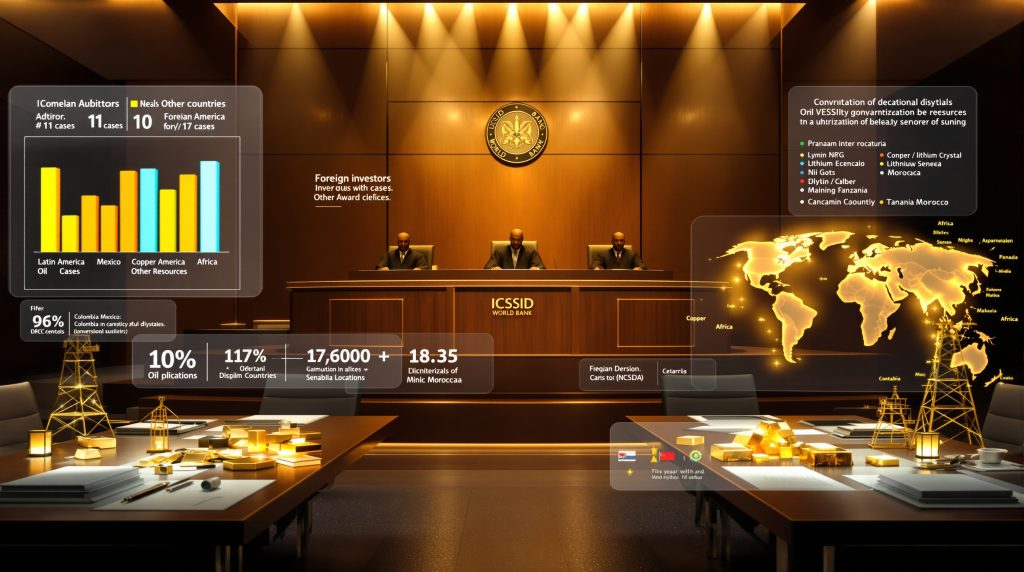Resource disputes between investors and states represent a critical juncture where international business meets sovereign authority. These legal confrontations emerge when foreign companies challenge government actions that negatively impact their natural resource investments, bypassing traditional diplomatic channels in favor of international arbitration mechanisms.
The landscape has transformed dramatically in 2025, with 32 disputes already lodged with the International Centre for Settlement of Investment Disputes (ICSID), surpassing the previous year's total according to legal analysis from DLA Piper. This surge reflects an unprecedented tension between state sovereignty and investor protection in the global resource sector.
When governments implement policy changes affecting mining, oil, or gas projects, foreign investors can circumvent domestic courts entirely. Instead, they invoke protections under bilateral investment treaties (BITs) or multilateral agreements, bringing their grievances before neutral international tribunals established specifically for cross-border investment disputes.
The arbitration process operates through sophisticated legal frameworks that treat investment flows as protected assets under international law. Unlike domestic business disputes, these cases unfold in a parallel legal universe where traditional state immunity yields to treaty-based investor rights, creating a unique intersection of commercial law and international relations.
The Core Mechanics of Investment Arbitration
The International Centre for Settlement of Investment Disputes, established in 1965 under World Bank oversight, provides the primary venue for resolving investor-state conflicts over natural resources. This institution processes cases through carefully structured procedures designed to balance investor protection with state regulatory authority.
Each dispute typically involves three-arbitrator panels ensuring balanced representation between investor and state perspectives. The tribunal composition requires strict nationality requirements for investor eligibility, followed by comprehensive investment criteria verification and detailed treaty protection analysis before proceedings can advance.
Historical data reveals the significant financial implications of these mechanisms. States have paid over $113 billion through ICSID awards historically, with the majority of these payments relating to extractive industries disputes. The average case duration spans three to four years from initial filing to final resolution, though complex resource disputes often extend beyond standard timelines.
Of particular significance in 2025, 17 of the 32 disputes filed specifically involve petroleum assets, highlighting the continued strategic importance of hydrocarbon revenues for emerging economies despite global energy transition trends. This petroleum focus underscores how traditional energy resources remain central to state fiscal planning and investor expectations.
The arbitration framework operates independently from domestic legal systems, creating enforceable international awards that can be collected through asset seizure in multiple jurisdictions. This mechanism provides investors with remedies unavailable through traditional diplomatic or commercial channels, fundamentally altering the risk-reward calculations for both parties.
Critical Mineral Competition Drives Unprecedented Surge
The dramatic increase in resource disputes stems from intensified global competition for materials essential to artificial intelligence infrastructure, electric vehicle manufacturing, and renewable energy systems. These critical minerals have transitioned from industrial commodities to strategic assets capable of determining national economic competitiveness.
Furthermore, the uranium investment dynamics demonstrate how these market forces create additional pressure on resource-rich nations. Additionally, regulatory developments such as the US Senate uranium ban illustrate how geopolitical factors further complicate these investment relationships.
"The scramble for minerals reflects their essential nature for multiple strategic technologies, from AI chips to electric vehicles, combined with geopolitical competition between major powers seeking preferential access to finite resources."
Strategic mineral categories driving disputes include:
• Lithium for next-generation battery production
• Cobalt for electric vehicle power systems
• Rare earth elements for advanced technology manufacturing
• Uranium for nuclear energy infrastructure
• Copper for electrical and renewable energy systems
• Manganese for industrial applications
The Democratic Republic of Congo exemplifies this competition intensity, hosting substantial reserves of cobalt, copper, lithium, and manganese deposits. According to resource disputes analysis, the DRC has become a target for numerous countries and investors, creating overlapping claims and competing development agreements that inevitably generate arbitration disputes.
Geopolitical tensions amplify these conflicts as the United States and China pursue competing strategies for critical mineral access. US officials have indicated openness to critical minerals partnerships with the DRC following direct outreach from Congolese senators proposing minerals-for-security arrangements, illustrating how resource access intertwines with broader strategic relationships.
The AVZ Minerals case demonstrates these dynamics in practice. In July 2025, the Australia-based company contested a new agreement between Kinshasa and US-backed KoBold Metals to develop part of a lithium project, claiming the arrangement breached an existing international arbitration order protecting AVZ's project interests.
Resource Nationalism Reshapes Investment Landscapes
Governments worldwide are implementing increasingly aggressive resource policies that prioritise domestic control over foreign investment commitments. This resource nationalism employs sophisticated policy mechanisms designed to capture greater value from natural resource endowments while asserting sovereign authority over strategic assets.
Mexico's lithium nationalisation in 2022 exemplifies this trend, with the government asserting complete state control over lithium extraction and development. This policy shift has generated 2 disputes through 2025, suggesting ongoing tensions between nationalisation objectives and pre-existing investor agreements.
Colombia under President Gustavo Petro has implemented particularly comprehensive resource nationalism measures. In 2024, the administration designated several mining areas as temporary natural reserves, instituted a complete fracking ban, and threatened to block coal exports to Israel. These policies have generated 4 arbitration cases, making Colombia the single largest source of disputes globally in 2025.
| Country | Disputes Filed | Policy Mechanisms |
|---|---|---|
| Colombia | 4 | Mining reserve designations, fracking bans |
| Mexico | 2 | Lithium sector nationalisation |
| Ecuador | 2 | Enhanced environmental restrictions |
| Panama | 2 | Regulatory framework changes |
Modern resource nationalism employs increasingly nuanced policy tools that blur traditional distinctions between legitimate regulation and indirect expropriation:
• Temporary natural reserve designations that effectively suspend mining operations
• Enhanced environmental impact requirements that delay or prevent project development
• Local content mandates that increase operational costs and complexity
• Export licensing restrictions targeting specific destination countries
• Discriminatory taxation that reduces project profitability below viability thresholds
According to Gabriela Alvarez-Avila, Partner and Co-Leader of International Arbitration at DLA Piper, states increasingly feel compelled to exert greater control over critical mineral deposits within their borders as the strategic value of these resources becomes more apparent to policymakers and the public.
Regional Patterns Reveal Strategic Priorities
Latin America leads global disputes with 11 total cases, representing 34% of all resource disputes filed in 2025. This concentration reflects the region's substantial mineral endowments combined with governments' increasing willingness to challenge foreign investor interests in favour of domestic resource control.
The distribution across Latin American countries reveals distinct policy approaches to resource nationalism. Colombia's 4 cases stem from comprehensive mining policy reforms, while Mexico's 2 cases reflect targeted lithium sector nationalisation. Ecuador and Panama each contribute 2 cases involving environmental restrictions and regulatory changes respectively.
Africa accounts for 10 disputes, demonstrating the continent's critical mineral wealth and evolving regulatory landscape. Countries involved include Niger, Tanzania, the Democratic Republic of Congo, Mali, Morocco, and Senegal, each facing distinct pressures from competing international mineral acquisition strategies.
The African dispute pattern reflects several underlying dynamics:
• Competing foreign investment claims over the same mineral deposits
• Evolving regulatory frameworks attempting to capture greater resource value
• Geopolitical pressure from major powers seeking preferential access
• Domestic political pressure to maximise benefits from natural resource wealth
European and Central Asian countries account for the remainder of identified disputes, though specific country breakdowns were not disclosed in the legal analysis. This geographic distribution suggests that resource disputes between investors and states are most intense in regions with substantial mineral endowments and developing regulatory frameworks.
Legal Protections Under International Investment Treaties
International investment treaties provide foreign investors with substantive legal protections that transcend domestic legal systems. These agreements create enforceable rights that investors can invoke through international arbitration when host states implement policies that negatively affect their investments.
Core investment protections typically guaranteed under modern treaties include:
• Fair and equitable treatment standards that protect against arbitrary government action
• National treatment provisions ensuring foreign investors receive equal treatment with domestic investors
• Most-favoured-nation clauses extending the best treatment offered to any foreign investor
• Expropriation compensation requirements mandating full compensation for asset seizures
Common government actions that trigger dispute proceedings include permit revocations without adequate compensation, implementation of discriminatory tax regimes, environmental regulations that effectively prevent operations, and contract renegotiations conducted under duress or threat of regulatory action.
The effectiveness of these protections depends on treaty language specificity and arbitral tribunal interpretation. Modern treaties increasingly incorporate exceptions for legitimate regulatory measures, environmental protection, and public health concerns, creating complex legal questions about the boundaries between protected investor rights and sovereign regulatory authority.
Breach scenarios in resource sectors typically involve multiple overlapping violations. For example, Colombia's temporary natural reserve designations potentially violate fair and equitable treatment standards while simultaneously constituting indirect expropriation if they permanently prevent mining operations without compensation.
How Do Mining Companies Respond to Policy Changes?
Mining companies facing adverse policy changes must carefully evaluate their legal options while considering business continuity requirements. For instance, the Paladin Energy halt demonstrates how regulatory uncertainties can force operational suspensions even before formal disputes arise.
Companies typically pursue multiple strategies simultaneously, including diplomatic engagement with host governments, seeking support from home country diplomatic missions, and preparing formal arbitration claims as a last resort. However, regulatory changes such as the Trump mining permits order can also create opportunities for accelerated project development in favourable jurisdictions.
Environmental Regulations Create Complex Legal Terrain
Environmental concerns increasingly influence resource disputes as states implement climate policies that restrict extractive operations. This creates tension between international investment obligations and domestic environmental commitments, generating novel legal questions about the scope of state regulatory authority.
Climate policy integration into resource governance includes:
• Carbon emission limitations affecting fossil fuel extraction operations
• Biodiversity protection measures restricting mining in sensitive ecosystems
• Water usage restrictions limiting extraction operations in water-stressed regions
• Waste management requirements increasing operational costs and complexity
Ecuador's 2 environmental-restriction-related disputes exemplify this dynamic. The government's enhanced environmental regulations apparently conflict with existing investor expectations, creating arbitrable disputes over the balance between environmental protection and investment treaty obligations.
The legal complexity emerges from determining whether environmental regulations constitute legitimate policy measures or disguised attempts to frustrate foreign investment. International tribunals must evaluate whether restrictions are proportionate, non-discriminatory, and implemented through transparent processes that respect investor due process rights.
Furthermore, corporate governance issues like the mineral resources lawsuit highlight how internal company disputes can complicate investment relationships with host states, creating additional layers of legal complexity in resource development projects.
Economic Implications of Rising Dispute Activity
Increased arbitration activity signals potential deterioration in investment climates across resource-rich jurisdictions. The surge to 32 disputes in 2025 suggests systematic tensions between investor expectations and state policy priorities, with implications extending beyond individual cases.
Investment climate deterioration manifests through:
• Reduced foreign direct investment flows into resource sectors
• Higher risk premiums demanded by investors and lenders
• Delayed project development due to regulatory uncertainty
• Cancelled exploration programs in jurisdictions with rising dispute activity
The $113 billion in historical ICSID awards demonstrates the substantial financial stakes involved in resource disputes between investors and states. States must evaluate whether immediate sovereignty gains from resource nationalism justify potential arbitration liabilities that can exceed billions of dollars per case.
Cost-benefit analysis for states requires balancing immediate political benefits from resource control against long-term economic consequences of reduced investment attractiveness. Successful resource nationalism depends on states' ability to develop domestic extraction capabilities while managing international arbitration risks.
For investors, rising dispute activity necessitates enhanced due diligence processes, more sophisticated political risk insurance, and greater emphasis on stakeholder engagement to prevent conflicts from escalating to formal arbitration.
Future Trajectory of Resource Investment Disputes
Several trends suggest continued growth in resource disputes through 2030, driven by accelerating energy transition demands, persistent geopolitical competition, and expanding environmental regulations that challenge traditional extractive industry operations.
Projected drivers of future dispute growth include:
- Accelerating critical mineral demand from artificial intelligence and electric vehicle adoption
- Intensifying resource nationalism as states recognise strategic mineral values
- Expanding environmental regulations restricting extractive operations
- Geopolitical competition between major powers for resource access
- Climate policy implementation affecting fossil fuel extraction viability
The concentration of disputes in petroleum assets (17 of 32 cases) suggests that traditional energy resources remain central to state-investor conflicts despite energy transition trends. This pattern may reflect states' attempts to maximise revenue from declining hydrocarbon assets while investors seek to recover investments before stranded asset risks materialise.
Strategic considerations for stakeholders require adaptation to evolving dynamics through enhanced stakeholder engagement, flexible contract structures incorporating regulatory change provisions, and comprehensive political risk assessment incorporating both traditional political risks and emerging environmental policy risks.
What Can Investors Learn From Current Patterns?
The international arbitration system faces pressure to evolve while maintaining effectiveness in resolving complex resource conflicts. According to investment arbitration experts, reform discussions focus on balancing investor protection with state regulatory space through clearer exception clauses, enhanced transparency requirements, and improved dispute prevention mechanisms.
In addition, resource disputes between investors and states will likely continue evolving as climate policies and critical mineral demands reshape the global investment landscape. Consequently, both investors and states must adapt their strategies to navigate this increasingly complex terrain while maintaining productive relationships that support sustainable resource development.
Disclaimer: This analysis is based on publicly available information and legal analysis as of late 2025. Resource disputes involve complex legal, political, and economic factors that can change rapidly. Stakeholders should conduct independent due diligence and consult qualified legal counsel before making investment or policy decisions based on this information. Projected trends represent analytical assessments rather than definitive forecasts, and actual outcomes may differ significantly from current expectations.
Looking for Investment Opportunities in Resource Development Companies?
Navigating the complex landscape of resource disputes highlights the importance of staying informed about market developments that could impact mining investments. Discovery Alert's proprietary Discovery IQ model provides instant notifications on significant ASX mineral discoveries, helping investors identify actionable opportunities in resource companies ahead of broader market awareness and capitalise on developments before they become widely known.




